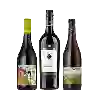
Domaine de ViviersPays de l'Herault
This wine generally goes well with beef, veal or pasta.
Food and wine pairings with Pays de l'Herault
Pairings that work perfectly with Pays de l'Herault
Original food and wine pairings with Pays de l'Herault
The Pays de l'Herault of Domaine de Viviers matches generally quite well with dishes of beef, pasta or veal such as recipes of slow-cooked fillet of beef, tuscan pastachute or pork cheeks with cider and honey.
Details and technical informations about Domaine de Viviers's Pays de l'Herault.
Discover the grape variety: Merlese
Intraspecific crossing between sangiovese or nielluccio and merlot noir obtained in 1983 by the University of Bologna (Italy), registered since 2007 in the Italian Official Register of wine grape varieties... totally unknown in France.
Informations about the Domaine de Viviers
The Domaine de Viviers is one of of the world's greatest estates. It offers 2 wines for sale in the of Hérault to come and discover on site or to buy online.
The wine region of Hérault
The wine region of Hérault is located in the region of Pays d'Oc of Vin de Pays of France. Wineries and vineyards like the Domaine La Grange des Pères or the Domaine La Grange des Pères produce mainly wines red, white and pink. The most planted grape varieties in the region of Hérault are Merlot, Cabernet-Sauvignon and Chardonnay, they are then used in wines in blends or as a single variety. On the nose of Hérault often reveals types of flavors of minerality, yellow apple or passion fruit and sometimes also flavors of nutty, anise or stone fruit.
The wine region of Pays d'Oc
Pays d'Oc is the PGI for red, white and rosé wines that are produced over a wide area of the southern coast of France. The PGI catchment area corresponds roughly to the Languedoc-roussillon">Languedoc-Roussillon wine region, one of the largest wine regions in France. The area covers all wines that are not produced under the strict laws that govern AOC-level appellations in the regions: among them, Corbières, Minervois and the Languedoc appellation itself. The Pays d'Oc PGI is arguably the most important in France, producing the majority of the country's PGI wines.
The word of the wine: Malic (acid)
An acid that occurs naturally in many wines and is transformed into lactic acid during malolactic fermentation.









